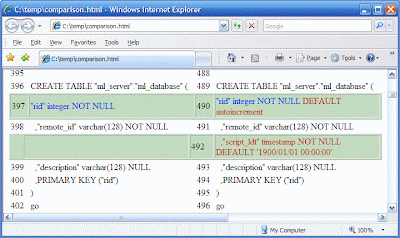[ An improved version of this article may be found here. It shows how to use this technique on all database versions 5.5 through 11. ]
Question: How do I compare the schemas of two SQL Anywhere databases?
Answer, from Bruce Hay at Sybase iAnywhere: Check out the new "-no" option for dbunload in SQL Anywhere 11 (unload objects in name order, no data)? It's intended for this purpose.
Here's how it works:
- Step 1: Run dbunload against the first SQL Anywhere database to create a text file containing CREATE TABLE and other schema definitions. The new -no option tells dbunload to unload just the schema, not the data, and do it in name order so it will be easier to compare with another text file sorted in the same order.
- Step 2: Run dbunload again, on the second SQL Anywhere database, to produce another text file.
These dbunload steps only work with the SQL Anywhere Version 11 copy of dbunload.exe, and they only work on Version 10 and 11 databases running on the Version 11 database engine. - Step 3: Run a text comparison utility like Compare It! to show the differences between the two text files.
"%SQLANY11%\Bin32\dbunload.exe"
-c "ENG=demo10;DBN=demo;UID=dba;PWD=sql"
-no -r c:\temp\demo10.sql
"%SQLANY11%\Bin32\dbunload.exe"
-c "ENG=demo11;DBN=demo;UID=dba;PWD=sql"
-no -r c:\temp\demo11.sql
"C:\Program Files\Compare It!\wincmp3.exe"
c:\temp\demo10.sql c:\temp\demo11.sqlHere's what Compare It! shows for one difference:
Compare It! can also produce a report in HTML format:

Here's why using dbunload is a good approach:
- The dbunload utility doesn't miss anything; it unloads every single schema object in the database... tables, views, procedures, triggers, everything.
- The dbunload utility is always going to be more up-to-date than any other software except the SQL Anywhere engine itself. In other words, even PowerDesigner falls behind dbunload in terms of supporting SQL Anywhere syntax for new features.
- Running dbunload on actual databases guarantees you will be comparing the current database schemas, not out-of-date information stored is separate model files.
- The text file comparison view presents differences in terms of actual database syntax, not some funky abstract logical view used by data modelling tools.
4 comments:
If you are interested in a tool that will do this for you, look at http://www.sqledt.com. It will also generate a synchronization script.
-no option does not work with Sybase SQL Anywhere Unload Utility Version 11.0.1.2527
It dumps help on stdout:
dbunload -c "uid=DBA;pwd=SQL;dbf=abc.db" -no -r newDb.sql -y -o newDbServer.log newDb
Same behavoir is observed in both windows and solaris.
@Anonymous: Try removing the "NewDb" from the end of the command line.
I find it helpful that dbunload can generate schema definitions for direct comparison.
Post a Comment